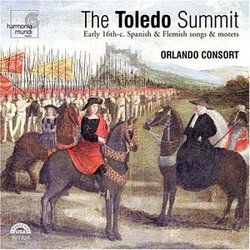| All Artists: Alfonso de Mondejar, Pierre de LaRue, Juan de Anchieta, Francisco de Penalosa, Francisco de la Torre, Alexander Agricola, Pedro de Lagarto, Antonius Divitis, Antoine Brumel, Orlando Consort Title: The Toledo Summit: Early 16th c. Spanish & Flemish songs & motets Members Wishing: 0 Total Copies: 0 Label: Harmonia Mundi France Original Release Date: 1/1/2003 Re-Release Date: 11/11/2003 Album Type: Import Genres: Special Interest, Pop, Classical Styles: Vocal Pop, Opera & Classical Vocal, Chamber Music, Historical Periods, Early Music Number of Discs: 1 SwapaCD Credits: 1 UPC: 093046732820 |
Search - Alfonso de Mondejar, Pierre de LaRue, Juan de Anchieta :: The Toledo Summit: Early 16th c. Spanish & Flemish songs & motets
 | Alfonso de Mondejar, Pierre de LaRue, Juan de Anchieta The Toledo Summit: Early 16th c. Spanish & Flemish songs & motets Genres: Special Interest, Pop, Classical
|
Larger Image |
CD Details |
CD ReviewsGreat performances, but not really the Toledo Summit... Maddy Evil | London, UK | 05/30/2005 (5 out of 5 stars) "This recording presents a selection of late 15th- and early 16th-century music from the courts of both the Habsburgs and that of Ferdinand and Isabella in Spain. The programme is well-contrasted, featuring works by many of the best known composers of the period (such as Josquin, Agricola, La Rue and Penalosa) as well as numerous pieces by lesser-known composers. The performances by the four vocal soloists of the Orlando Consort are excellent - indeed, the Cancionero pieces are amongst the best "a cappella" renditions of this repertory currently available, and the CD is worth buying for these tracks alone.
That said, the extent to which this recording accurately reflects the type of performances which were heard during the Toledo Summit (Philip the Fair's ceremonial visit to Toledo, 1502) is a different matter altogether. Certainly, the interpretations of sacred music seem unduly minimalist given the size of Philip's Chapel (which numbered 28 members in 1500, growing to 33 by his death in 1506), and they seem even more implausible in view of Antoine de Lalaing's eyewitness account, which claims that 60-80 Spanish singers participated in the Mass sung in Toledo Cathedral on May 8th 1502. Furthermore, it is known that the singers were joined by the distinguished German cornettist Augustein Schubinger, and it is quite possible that other instrumentalists (e.g. the sackbut player Hans Nagel?) could have been present. At a comparable political event the following year (1503), in Innsbruck in the presence of Emperor Maximilian I and Philip the Fair, the Mass was performed by the two chapels and 'the sackbuts of the King [of the Romans]' who 'played the Deo gratias and the Ite missa est, and the singers of monseigneur [Philip the Fair] sang the Offertory' (Martin Picker, Chanson Albums of Marguerite of Austria, Berkeley, 1965, pp. 23-5). In short, the music heard during the Toledo Summit must surely be seen in the context of such accounts. The performances of secular music on this recording are more convincing, although it is worth noting that, again, this repertoire was not always performed by voices alone - other possibilities included an ensemble of 'bas' instruments (without singers), or 1 singer accompanied by lute and/or harp. It seems reasonable to suppose that a number of these performance practice traditions were exploited during an event as grandiose and politically important as the Toledo Summit (for more on performance of Cancionero songs, see literature by Tess Knighton; also briefly discussed in my review of Gothic Voices, The Voice in the Garden: Spanish Songs and Motets 1480-1550) In short, this recording can be highly recommended, both for the variety and beauty of the music and also for the superb performances, even if it is probably not representative of the original event." |

 Track Listings (21) - Disc #1
Track Listings (21) - Disc #1